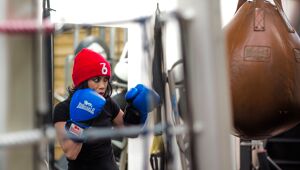
An old saying holds that the road to Hollywood is paved with broken dreams. What an inspiration, then, when someone leaps the pitfalls and makes it to town with dreams intact.
In this case, the road ends in the Los Angeles neighborhood of Van Nuys. We arrive there on a brisk February day, the sky covered in gray clouds. We hear the whine of planes landing at the nearby Van Nuys airport. It doesn’t seem like the place we’d find the set for one of TV’s most overlooked talk shows. Then again, Hollywood is a land of illusion.
The show, incidentally, is Fox Soul’s The House, a round table discussion show in the same vein as The Talk or The View. Unlike the others, however, The House has the distinction of featuring four LGBTQ, African-American hosts: psychologist/life coach Antonio LeMons; clinical psychologist Cheryl Rich; stylist Chris Curse; and writer Aaron Johnson Levy. Together, they comprise the “family,” a panel discussion group that gathers each week at the dinner table for a chat, and for a gourmet meal prepared by in-house chef Sean Freelon. To any viewer, the iconography should strike a chord: Rich and LeMons, both middle-aged, evoke the image of parental figures. Curse and Levy resemble the kids who squabble but deeply love each other.
Our invite to sit at the table and chat with the hosts also carries an unusual responsibility: we’re the first-ever publication invited to visit the set of the show. In other words, it feels a lot like we got an invitation to a formal dinner party.
How about we take this to the next level?
Our newsletter is like a refreshing cocktail (or mocktail) of LGBTQ+ entertainment and pop culture, served up with a side of eye-candy.
As we enter the darkened sound stage, one presence stands out among the various grips, stagehands, and costumers gathered around the set: that of the series director, Kurt T. Jones. Jones, dressed in jeans and a purple and white button-down shirt, has a bearlike presence to him. He stands at the monitor watching the cast during filming, giggling and waving his arms around like the conductor of an orchestra. He hangs on their every word, silently cheering them on with each passing comment.

His enthusiasm infects the rest of the crew. Everyone sits with rapt attention watching the cast on the set. A stagehand offers us a place to sit and watch as Jones finishes a segment. We plop down in a folding makeup chair joining the rest of the crew to watch with excitement.
Director Jones calls lunch, and the crew begins to exit the stage. He then walks over and offers a firm handshake and warm smile.
“Welcome,” he says. “Come meet the family.”
Jones escorts us to the actual set, a dining room decorated with chic accents… and a few bottles of Smirnoff, the sponsor of the series’ new season. The design could pass as something out of an upscale, American home: a functioning kitchen at the far end of the set, a small foyer where guests “enter” the house, and a grand dining room accented by wall art. The dark peach color of the walls meshes well with the hardwood floors. It all feels classy and, well, homey as we cross the room.
Jones seats us at the middle seat of the dining table, flanked on either side by two of the hosts. He then calls out to his crew for quiet on the set, so that we can converse with the four stars without distraction.
In this case, the term “star” feels all too fitting. Aaron Johnson Levy strides onto the set dressed in a head-to-toe gold frock, the upper bodice constituting of sequined mesh, exposing a bit of his skin. A golden tiara adorns his shorn head, a bit of gold glitter on his eyelids. The ensemble looks like something from a Hollywood awards show, and Levy makes it look glamorous and handsome at the same time.
He greets me with a warm embrace, sitting down next to me at the table.
“I’m told this show begins with you,” we say. “You get creator and host credit.”
Levy smiles wide, shrugging a bit.
“It really starts 30 years ago in a penitentiary with Cheryl,” he says with humility.
“Oh, Aaron!”

The two of us look over to see Cheryl Rich join us. She wears a black sequin dress, rhinestone-crusted cat’s eyeglasses, and a tiara of her own. Rich is diminutive in height and yet somehow a towering presence. As she smiles and greets us, her deep, hazelnut eyes seem to peer right into our soul. Somehow, that doesn’t feel invasive.
“Let me get the story right,” Levy says giggling. “Cheryl was sitting in a cell and she saw an episode of The Beverly Hillbillies. She saw they moved to Los Angeles and got rich. And she thought I can do that. So she set a goal, packed up five boxes, a computer, and a dream, and moved to Los Angeles and began a journey to Hollywood.”
Next to Levy, Rich laughs.
“Aaron reminded me of myself,” Rich adds. “My family didn’t know what to do with me.”
“We’ve known each other because my cousin was someone she managed,” Levy continues. “I left Cleveland and was pitching a screenplay around. My family didn’t believe that my career in entertainment was going to be successful. It created a lot of friction. And Cheryl said, ‘Come live with me.’ So I moved in with Cheryl for six months. And she had a longtime friend, Doug DeLuca, a longtime producer of Jimmy Kimmel Live. He’s a talk show producer, he liked the LGBTQ space. So I put together a proposal, showed it to Cheryl, and sent it to Doug. He called me back that same day and said ‘Let’s get started on it.’”
“But why this format?” we ask.
“As a gay, African-American man, I thought about how I didn’t have many role models,” Levy explains.
Next to him, Rich sits up in her chair.
“I would say, in my life, I was a hardcore drug user so today I could become a role model for young people as someone who turned her life around.”
Rich can’t overstate her achievement. She grew up in the Cleveland ghetto and survived rape, addiction, prison and the death of a child. Yet, from tragedy came resolve. She managed to complete her M.A. Degree in Clinical Psychology from Antioch University.
“Today I just come so I can be that role model,” Rich says in a low voice. “So the way I come, is just because I want to be free.”

At that point, the rest of the family joins us at the table. Antonio LeMons, robust and dignified, sits down at the head of the table opposite Cheryl. Bespectacled and dressed in a black velvet suit, he radiates debonair energy.
Chris Curse, by contrast, almost bounces onto the set. He wears a shimmering silver and navy blue suit, no shirt underneath, his curly hair flowing in waves to his shoulders. He also has a smile so radiant, it almost seems to sit down next to us before the rest of him.
We greet Curse and LeMons as they join in the chat. It seems like a perfect segue to find out how they landed their roles on the show.
“I’m a hairstylist,” Curse says. “I did modeling, promotions, infomercials, but not at this level. My own journey, having been around a lot of women and gays, a lot of the topics we discussed I would hear about from multiple perspectives. I felt I could be an image that never existed for me.”
“I had done on camera, but I’m not an actor,” LeMons adds, echoing Curse. “That was what was great about it: I got to be me. When Kurt reached out to me in late 2019, I said ‘Sure.’ But in 30 years of living here, everybody has a show, and I had heard this many times. Kurt said he wanted someone for the show that already had a life. I was married, I had children, I’m a professional. I’ve done a lot of things in my life, and gay is a part of that. So here I am.”
The full cast assembled at the table, we pose a pressing question to the group. Unlike a scripted show which can use drama and subtext to examine moral or social issues, a talk show only provides analysis through conversation. And yet, we sit at the table of a family.

“What hope do you want to provide to viewers?” we ask. “Is using family iconography a way to have the queer, black family you always wanted?”
“Everybody’s experience starts in the family,” LeMons points out. “I grew up in a family with roles. I know Cheryl’s familiar with this. As trained psychologists, we know everything starts in a family system. Whether we’re the mother, the dad—and she could be the dad, I could be the mother. There is a ‘mother role’ and a ‘dad role’ that people identify with. They will see us and find that in our dynamic. I don’t think of it as being Antonio the father. I’m just following the archetype.”
“What I hope I do is inspire young people to be themselves,” LeMons continues. “I’m very political. So when I see young people today able to date in middle school, I feel a sense of pride in that.”
The other hosts nod in agreement.
“I’m an elder, and I take that role very seriously,” he further elaborates. “To me, this is just another platform to model freedom. I’ve been free a very long time, and in viscous environments. I’ve been myself a very long time, and I know what’s possible when I am. I didn’t have someone to model that for me. So I hope for others who need someone to look to, I can be that.”
“I’m teaching older, not LGBTQ people who might have a queer child, a queer relative, and who don’t understand it,” Levy adds. “The show gives them clear information and tools to connect.”
“I think because I have so many relationships with people who are not LGBTQ, I am always probing and wanting to get information that I know they are seeking,” Curse agrees. “They want to know.”
We chat a bit about the changing social climate in the United States, especially following the #BlackLivesMatter protests of 2020. Has the nation moved closer to racial justice? Does the existence of The House signal that?
“King George Floyd wasn’t just a black man with a knee on his neck,” Rich utters, her voice low and passionate. “That was a universal moment from the creator of all Heaven and Earth. The pandemic—or the plandemic, whichever you believe—had everyone in jail. So the uproar that came from that was from people who, for the first time, experienced incarceration. During that time, people said to me, ‘Come on Cheryl. It’s not as bad as prison.’ And I’d say ‘It’s worse than prison. In prison you know you can’t go anywhere.’ That moment in time changed the dynamic.”

We glance at Rich’s three co-hosts. All watch her with quiet reverence, their eyes beaming with pride.
“The revolution is being televised,” she continues through a Mona Lisa smile. “What we can say now is that it’s a new day. It’s a new consciousness. Young people are coming up in love with someone they know over in Africa. And that white girl that listens to rap music that blends genres is tired of the rotting of racism.”
“I always say, it wasn’t George Floyd,” Rich says, folding her hands atop the table. “It was women, mothers: little, white Timmy saying ‘Mommy, look!’” Her voice cracks a bit with emotion.
“So white women took to the streets. And there is no going back,” she declares. “There’s no stopping that.”
By that time, stagehands had begun to return from lunch, and we notice a restless Jones pacing back and forth across the soundstage. Our time had grown short, so we again thank the four hosts for the invitation to their dinner table.
Then, we ask a final question.
“LGBTQ people know a thing or two about injustice,” we observe. “And yet, one take away from the conversation started by the #BlackLivesMatter protests is that African-Americans don’t always feel welcome in queer spaces.”
“Being from Chicago, anything that was ‘protected’ gay was up north and it catered to a white crowd,” Curse offers. “To this day, there is not a black gay club, restaurant or bar in that area. There used to be, but as they attracted blacks from the west and south side, the neighborhood resisted it. So they got shut down.”
“So how can those of us who are queer, but not African-American, make sure black folks always feel welcome?” we ask.
“Listen,” Lemons suggests. “That’s the first thing that comes to mind. I have to add a caveat: I understand why Chris said that, but I’ve lived in this town 36 years and never not felt welcome in West Hollywood. But I have contemporaries who have had that experience. I am a big believer in you creating your own experience. That’s not to say racism and homophobia and all those nasty things don’t exist. But we co-create our experience.”
“So, for me, listening,” he reiterates. “Most organizations I have worked in within the queer community have been white organizations who believed that having someone like myself at the table meant they had all black people at the table. I don’t represent all black people. Stop setting the table, then inviting us. Invite us from the beginning. Let us co-create.”
“To Antonio’s point,” Curse responds, “my comfort in a West Hollywood-type situation isn’t specifically for me. If I go and sit there in fabulous clothes, they think it’s amazing.” Curse spreads his arms out in a grand pose. We all chuckle and nod in agreement.
“But if six of us all went to the door,” he qualifies, “and we were all black, it’s going to be different than if we were all white. There’s a different reaction when we’re in numbers. When we’re in numbers, we’re a gang. Recognize that.”
“A lot of what I’ve experienced is discrimination at the bar,” Levy volunteers. “It’s like am I invisible? You’ve served everyone, and I’ve been standing here trying to be polite, not trying to look like a ghetto black person. But that doesn’t get me anywhere either. Then, if I say something, I’m ‘rude.’ These are the experiences that make us feel unwelcome.”
“Not everyone owns a bar,” he further observes, “but everything filters down from the top. So I’d love to see more black-owned businesses. Hire more black bartenders, more drag queens, more gogo dancers. Give them opportunities. It brings representation.”
Across the table, with quiet dignity, Cheryl Rich punctuates their answers.
“Thank you for asking us that,” she says, voice warm.
Jones and the crew return from their lunch and begin to return to their stations. The five of us share the silent realization that our time has come to an end. The four hosts stand and offer us parting hugs. We again express our gratitude.
The five of us pose together, one last time for a group photo. As we exit the soundstage, we take one look back as the four hosts of The House prepare to film another segment. We smile. The House may break new ground as a show with four, queer, African-Americans at the table, but the real value comes from the wisdom and warmth of its hosts.
Just like a family offering a seat at the dinner table.
The new season of The House debuts on Fox Soul on April 1. The show will also have a special showing as part of OutFest Fusion April 8-17. Season 1 is available to stream on YouTube.
Photos by Larry Geller.





















Kangol2
Antonio LeMons is also a talented writer, so I’m glad to see he’s part of this group.
As for the panelist speaking of “plandemics,” she goes on mute. Sorry but not sorry.